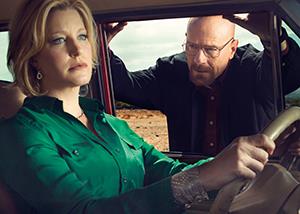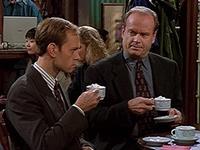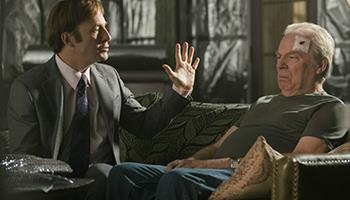AMC’s Breaking Bad turns 10 years old this month, which its network is celebrating by repeating the entire series, in sequence, on weekends through the end of January. The celebration is richly deserved, and not only for the way the series advanced the evolution of quality TV in general, and AMC in particular.
Breaking Bad also happens to be, in my opinion, the best TV drama series ever presented. It’s got brilliantly written and performed characters, its photography is astounding, its choice and usage of music is impeccable – and its storylines are stunningly inventive, and, quite often, inventively stunning. More than most series, it told a tale with a concrete beginning and end, tracing the arc – the descent into murderous evil – of an initially meek and benign central character.
Yet days before the show’s Jan. 20, 2008 premiere, I still hadn’t seen it. I’d put it off, because, based on the description in AMC’s press materials that came with the advance DVD, I couldn’t imagine a series description that appealed to me less.
 A high school science teacher, who struggles to make ends meet by moonlighting at a car wash, is given a diagnosis of terminal cancer. To provide for his pregnant wife and teen son, he decides to use his prowess as a chemist to manufacture some super-pure crystal meth, and team with a former student to sell it. Nothing about that premise appealed to me, and the idea of former Malcolm in the Middle dad Bryan Cranston in this depressing-sounding role didn’t help.
A high school science teacher, who struggles to make ends meet by moonlighting at a car wash, is given a diagnosis of terminal cancer. To provide for his pregnant wife and teen son, he decides to use his prowess as a chemist to manufacture some super-pure crystal meth, and team with a former student to sell it. Nothing about that premise appealed to me, and the idea of former Malcolm in the Middle dad Bryan Cranston in this depressing-sounding role didn’t help.
Then I put the DVD in and previewed the Breaking Bad pilot.
The opening moments hooked me, and the rest of that first hour never let me go. Series creator Vince Gilligan, who wrote and directed the pilot, launched his series with visuals and action that couldn’t have been more dynamic. If you don’t remember, or never saw it, seek out that opening episode anew – it’s available for streaming on Netflix and elsewhere – and marvel at its compactness, uniqueness, and dizzying originality.
Then repeat the same experience, if you like, through all five seasons. Breaking Bad never falters, and never disappoints. As good as its premiere episode is? Its final episode is just as satisfying.
The core cast is superlative, and in many scenes unforgettable. There’s Cranston as Walter White; Aaron Paul as his student and co-conspirator Jesse Pinkman; Anna Gunn as Walter’s wife, Skyler; RJ Mitte as their son, Walter Jr.; Betsy Brandt as Skyler’s sister, Marie; and Dean Norris as Marie’s DEA agent husband, Hank.
And the supporting players are just as good – so good, in fact, that they’ve populated, and propelled, ABC’s Better Call Saul, the Breaking Bad spinoff that just repeated its ranking as my top TV series of the year.
 Put it this way: Better Call Saul is the best drama series to be spun off from another drama. It’s the more serious equivalent of Frasier, the best comedy series to be spun off from another great sitcom, which was Cheers. And both Frasier and Better Call Saul have managed to thrive by focusing on an entertaining supporting character from one show and pairing him with a formerly unseen and unmentioned brother, who turns out to be the new show’s most dynamic and important relationship.
Put it this way: Better Call Saul is the best drama series to be spun off from another drama. It’s the more serious equivalent of Frasier, the best comedy series to be spun off from another great sitcom, which was Cheers. And both Frasier and Better Call Saul have managed to thrive by focusing on an entertaining supporting character from one show and pairing him with a formerly unseen and unmentioned brother, who turns out to be the new show’s most dynamic and important relationship.
With Frasier, it was Frasier Crane and fussy little brother Niles. With Better Call Saul, it’s Jimmy McGill (not yet renamed Saul Goodman, but still played by the fabulous Bob Odenkirk) and even fussier big brother Chuck, played by veteran comic and character actor Michael McKean.

McKean, in a role much deeper and more demanding than initially expected, was a revelation, as is Odenkirk. And while we know Odenkirk’s Jimmy, in a season or two, has to morph fully into the Saul Goodman we know from Breaking Bad, that doesn’t necessarily mean the end of this story. While Better Call Saul is a prequel, its season-opening teasers (black-and-white vignettes in which a post-Breaking Bad former Saul, and former Jimmy, toils in intentional anonymity at a Cinnabon in Omaha) are sequels – so Gilligan and Breaking Bad writer-producer Peter Gould, who paired to create the Saul spinoff, could conceivably carry their narrative not only backward, but forward. At least for the few characters still left standing.
“Chemistry is the study of matter,” high school science teacher Walter White told his students 10 years ago, in the first episode of Breaking Bad. “I prefer to see it as the study of change.” And then Walter White, with his cancer diagnosis, began to break bad.
The Breaking Bad series and its spinoff Better Call Saul, on the other hand, have done nothing but break great. And by the time this sprawling story is over, Gilligan and company may have pulled off an unprecedented TV hat trick, and presented a series, a prequel, and a sequel – all of them as good as TV gets.